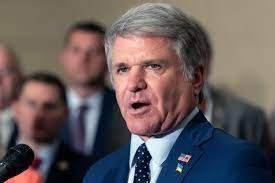United States House Foreign Affairs Committee Chairman Michael McCaul has sent a letter to the Special Inspector General for Afghanistan Reconstruction (SIGAR) John Sopko requesting that SIGAR examine US-supported humanitarian aid to Afghanistan in order to ensure it is not benefiting the Taliban.
In December questions were raised as to whether tens of millions of dollars in cash aid flown into Kabul every week by the United States and the United Nations was going to those who needed it most or whether it was going to the Taliban.
While aid agencies said the cash was not going to the Taliban, SIGAR reported in February that the money being flown into the country was indeed filtering through to the group and that Washington needs to rethink whether its support programs are worth it.
According to SIGAR’s latest report, the United States has appropriated or otherwise made available over $8 billion in assistance to Afghanistan and Afghan refugees since late 2021.
In line with this, McCaul sent a letter late Friday to SIGAR and called on Sopko to report to the committee on a number of issues including the sufficiency of mechanisms in place to prevent the diversion of taxpayer dollars to the Taliban.
He stated in the letter that he was concerned about ongoing US assistance to Afghanistan being abused or subject to waste, fraud or benefiting the Taliban.
He said that “it is essential that US funds should be spent on US priorities and not benefit the Taliban, which represses women and girls, imposes a cruel interpretation of Sharia law, and remains unrecognized as a legitimate government by the US and international community.”
“In the wake of the calamitous withdrawal of US personnel and the collapse of the former Afghan government, SIGAR’s independent and objective oversight of the billions of dollars continuing to support the people of Afghanistan remains as vital as ever.
“Specifically, despite the withdrawal, the Department of State and US Agency for International Development (USAID), among other entities, have continued to spend billions across multiple humanitarian and development sectors, including support for women’s rights, healthcare, food assistance, agriculture, education, and assisting internally displaced persons in Afghanistan,” McCaul stated.
He noted that SIGAR was in a unique position to assess, evaluate and investigate ongoing assistance to Afghanistan and that it was “imperative” that the auditing watchdog continues in its role.
However, he pointed out in the letter that since August 2021, the US Department of the Treasury’s Office of Foreign Assets Control (OFAC) has issued multiple General Licenses to provide for the continued flow of assistance to support Afghanistan through “legitimate and transparent channels.”
He stated that in February 2022, OFAC issued General License 20 which authorizes direct payments for the Taliban for the payment of “taxes, fees, or import duties, or the purchase or receipt of permits, licenses, or public utility services,” associated with assisting Afghanistan.
On December 20, 2022, the head of the United Nations Office for the Coordination of Humanitarian Affairs, Martin Griffiths, reported that UN agencies and non-governmental (NGO) partners have been conducting authorized transactions with Taliban-controlled entities for the delivery of humanitarian aid and basic services.
According to Griffiths, these payments are essential to ongoing humanitarian activities. However, SIGAR reported in January 2023 that “neither the State Department nor SIGAR have visibility on how much revenue the Taliban-controlled ministries may be collecting from fees and other payments from UN agencies or NGOs.”
Given the significant concerns about US taxpayer dollars benefitting the Taliban regime, McCaul requested that the watchdog report to the committee on the extent to which US funds intended to respond to a humanitarian crisis in Afghanistan have been provided to the Taliban to pay taxes, fees, import duties, or for the purchase or receipt of permits, licenses, or public utility services since August 2021.
He also stated that he remains concerned that the US State Department and USAID lack visibility into the expenditure of funds once they are transferred to international organizations, such as the World Bank and the United Nations among others, and that funds may not be used as intended.
As such, he requested that SIGAR report to the committee on the total amount of funding provided to Afghanistan through such international organizations.
He also called for SIGAR to report to the committee on the processes and procedures used by Afghanistan International Bank (AIB) to convert US dollars flown into the country into local currency for humanitarian use in Afghanistan; on the impact of the introduction of large amounts of US dollars into the Afghanistan economy and their beneficiaries.
SIGAR was also asked to report back to the committee on the operations, policies, and expenditures of the $3.5 billion in the “Afghan Fund” and determine whether adequate safeguards have been put into place for protecting Fund disbursements from waste, fraud, and abuse – to include diversion (or other direct or indirect support) to the Taliban regime.
In addition McCaul asked whether all appointments to the Afghan Fund board had been vetted and asked for suggestions on how to improve the operations and effectiveness of the fund.
“In the interest of expediency, SIGAR may respond to these requests in multiple reports, as appropriate,” he said.In conclusion, he urged SIGAR to “immediately notify the Committee if SIGAR encounters any obstruction, noncompliance, obfuscation, or unreasonable delay in the provision of requested information from the Department of State, the Department of the Treasury, USAID, or any other executive branch agency,” adding that the same applies to requests for information from the UN, the World Bank and any other international organization.





